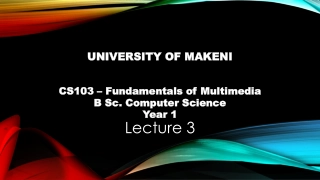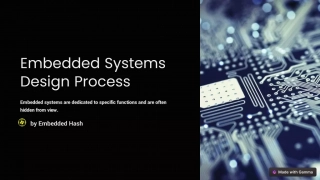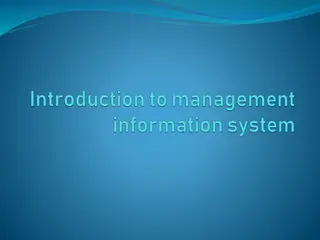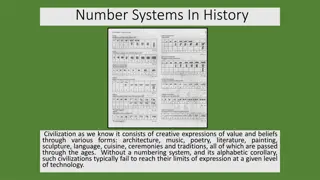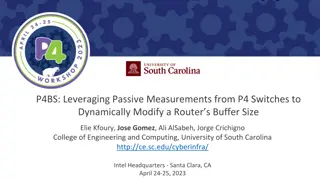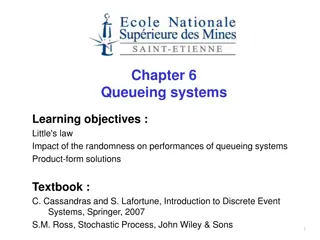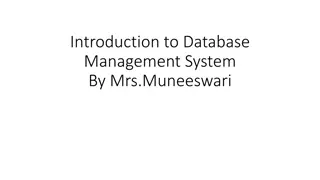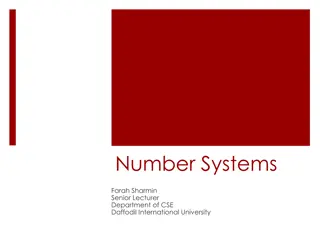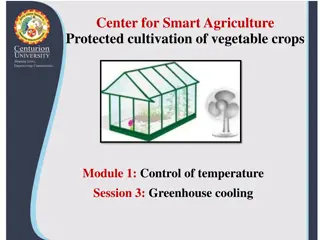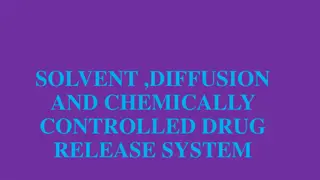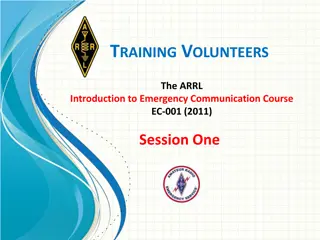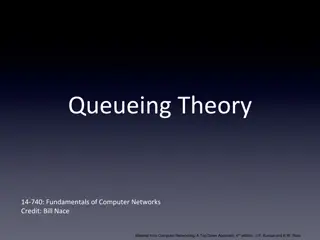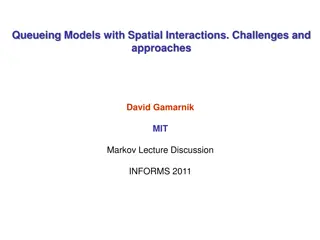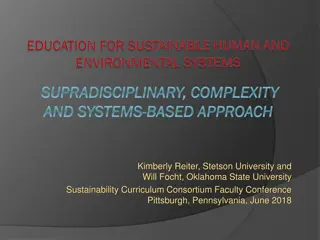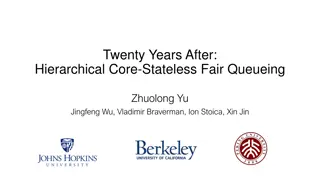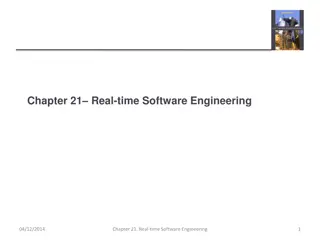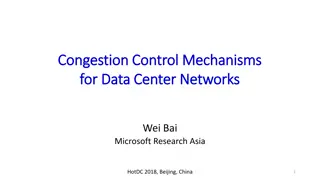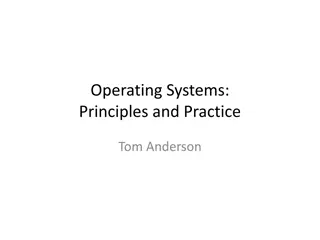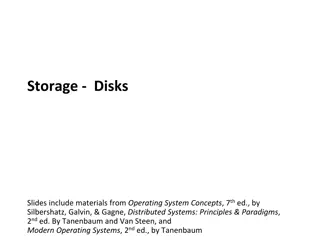Enhancing Food Systems for Improved Food Security and Job Creation
The importance of improving food systems to achieve sustainable development goals and enhance food security and job creation. It covers topics such as the current food systems, the impact of these systems, jobs in the food systems value chain, and key recommendations.
8 views • 24 slides
Understanding Multimedia Systems: Hardware and Software Components
Multimedia systems require specific hardware and software components to meet the demands of producing and playing multimedia content. Development systems are used for creating content with higher specifications, while playback systems are used for playing multimedia files with lower specifications.
8 views • 46 slides
Embedded Systems Design Process in the Embedded systems
Embedded systems are all around us, from the tiny microcontrollers in our household appliances to the sophisticated control systems in cars and aeroplanes. But how are these systems designed? Let's delve into the basics of the embedded systems design process in simple terms that anyone can understan
2 views • 9 slides
Overview of Distributed Systems: Characteristics, Classification, Computation, Communication, and Fault Models
Characterizing Distributed Systems: Multiple autonomous computers with CPUs, memory, storage, and I/O paths, interconnected geographically, shared state, global invariants. Classifying Distributed Systems: Based on synchrony, communication medium, fault models like crash and Byzantine failures. Comp
9 views • 126 slides
System Modeling and Simulation Course Overview
This course covers the basics of systems modeling, discrete-event simulation, and computer systems performance evaluation. Topics include Monte Carlo simulation, probability models, simulation output analysis, queueing theory, and more. Professor Carey Williamson leads the course with a focus on pra
4 views • 21 slides
Operating Systems
An operating system is a crucial program that manages all other programs on a computer. It handles tasks like input recognition, file management, and device control. There are different types of operating systems such as single-user, single-task systems, multi-user, multi-task systems, real-time ope
6 views • 11 slides
Understanding Information Systems in Organizational Management
Management in organizations is divided into three levels: operational, tactical, and strategic. Each level requires different information systems to support various activities. Operational systems focus on routine transactions and control processes, while middle-level systems aid in semi-structured
9 views • 39 slides
Understanding Negative Results in Systems Research
Systems research encompasses various areas such as operating systems, networking, and distributed systems. Negative results in systems research often go unpublished, leading researchers to focus on curating positive outcomes. This practice can hinder the credibility of scientific findings and impede
5 views • 23 slides
Explore the Top 5 Trends in Alarm Systems with Shellharbour Security Systems
Explore the latest trends in alarm systems with Shellharbour Security Systems. Learn about advancements such as smart home integration, wireless technology, AI-powered monitoring, and more. Stay informed to enhance your home or business security with cutting-edge solutions. Visit: \/\/shellharbourse
7 views • 8 slides
Understanding Management Information Systems (MIS)
Management Information Systems (MIS) are vital for collecting, processing, and analyzing data in business activities. They assist decision makers, facilitate communication, and maintain records. Components include people, data, business procedures, hardware, and software. Various types of informatio
2 views • 11 slides
Number Systems In History
Civilizations throughout history have expressed their values and beliefs through various creative forms like architecture, music, and literature. The development of numbering systems played a crucial role in advancing society's ability to communicate, track records, and engage in trade. From the ear
1 views • 17 slides
Dynamic Buffer Sizing using Passive Measurements from P4 Switches
This study explores the dynamic modification of router buffer sizes by leveraging passive measurements from P4 switches. By dynamically adjusting buffer sizes based on factors like the number of long flows, average round-trip time, queueing delays, and packet loss rates, network performance can be o
3 views • 14 slides
Introduction to Queueing Systems and Applications
Explore the fundamentals of queueing systems, including Little's law, impacts of randomness, and product-form solutions. Delve into the history of queueing theory and its applications in traffic control, planning, and facility dimensioning. Understand the classification and characteristics of simple
0 views • 90 slides
Introduction to Database Management System Explained
This presentation covers the basics of database management systems, including definitions of data, types of data, structured and unstructured data, storing data in computers using file systems and database systems, and issues with file systems like data redundancy, inconsistency, difficult data acce
1 views • 18 slides
Understanding Different Types of Recommender Systems
Recommender systems play a crucial role in providing personalized recommendations to users. This article delves into various types of recommender systems including Collaborative Filtering, Content-Based, Knowledge-Based, and Group Recommender Systems. Collaborative Filtering involves making predicti
0 views • 7 slides
Understanding Number Systems and Their Characteristics
Dive into the world of number systems, exploring non-positional and positional systems. Learn about the unique features of each system, including the use of symbols and digits, as well as how to convert numbers between different bases. Discover the Decimal Number System and its significance in every
2 views • 33 slides
Efficient Greenhouse Cooling Systems for Smart Agriculture
Active summer cooling systems like fan-and-pad and fog systems are crucial for maintaining optimal temperatures in greenhouses. These systems work by utilizing evaporation to remove heat from the air. Fan-and-pad cooling systems have been in use since 1954, where water is passed through pads to cool
1 views • 23 slides
National Mine Safety Week 2023 - Vehicle Safety Guidelines
Explore the comprehensive safety guidelines for vehicle operation during National Mine Safety Week 2023. Learn about maintaining safety equipment, cabin safety systems, visibility safety systems, operational safety systems, emergency safety systems, other safety systems, training responsibilities, a
1 views • 10 slides
Understanding Enterprise Resource Planning (ERP) Systems
Enterprise Resource Planning (ERP) systems are comprehensive business management systems designed to coordinate resources, information, and activities within an organization. From integrated systems to non-integrated ones, ERP offers various advantages such as customization, increased data security,
1 views • 17 slides
Polymeric Controlled Drug Delivery Systems
Polymeric controlled drug delivery systems play a crucial role in regulating drug release through diffusion, solvent penetration, and chemical mechanisms. These systems include diffusion-controlled, solvent-controlled, and chemically-controlled devices, each operating based on specific principles. S
0 views • 33 slides
Understanding Queueing Theory: Applications and Notations
Queueing theory is a mathematical study focused on predicting wait times and server configuration in systems with queues, such as telephone call centers, factories, and air travel. This theory helps in optimizing service levels and resource allocation to minimize waiting times and enhance efficiency
1 views • 32 slides
Understanding Emergency Communication Systems for Volunteer Training
This content covers various topics related to emergency communication systems for volunteer training, including agency communication systems, government radio systems for police and fire departments, emergency medical radio systems, American Red Cross frequencies, and types of served-agency radio sy
2 views • 29 slides
Introduction to Embedded Systems Design
Embedded Systems Design, Chapter 1 provides an insightful overview of embedded systems, distinguishing them from general-purpose computers. The chapter delves into the characteristics of embedded systems, their design considerations, and the various types of embedded computers such as general-purpos
1 views • 7 slides
Parent Seminars on Admission Arrangements for Nursery Classes in KGs for the 2019/20 School Year
Government-led initiatives have ushered in a new kindergarten education scheme, impacting K1 admission arrangements. Objectives include streamlining enrollment processes, reducing queueing, and aiding parents in securing timely placements. Details cover KGs involved, measures taken, and enhanced sup
0 views • 45 slides
Information Systems in Organizations: Overview and Implementation
Information systems play a crucial role in organizations, encompassing transaction processing systems, functional area information systems, and enterprise resource planning systems. This content delves into the purpose of transaction processing systems, the support provided by information systems ac
0 views • 30 slides
Multiserver Stochastic Scheduling Analysis
This presentation delves into the analysis and optimality of multiserver stochastic scheduling, focusing on the theory of large-scale computing systems, queueing theory, and prior work on single-server and multiserver scheduling. It explores optimizing response time and resource efficiency in modern
0 views • 38 slides
Understanding Cascade Control Systems in Industrial Processes
Cascade control systems play a crucial role in improving process control efficiency by incorporating feedback loops within feedback loops. This type of control architecture helps to better handle disturbances and variations in the process by creating secondary loops that monitor specific parameters.
0 views • 8 slides
Understanding Queueing Theory in Computer Networks
Queueing theory is a powerful analytic tool used to analyze performance in queueing processes, applicable in various industries including retail, manufacturing, and computer networks. It involves studying characteristics such as arrival patterns, service patterns, and queue disciplines to make perfo
0 views • 61 slides
Spatial Interactions in Queueing Models: Challenges and Approaches
Explore the complexities of queueing models with spatial interactions, delving into loss models, stability questions, and performance analyses. Researchers tackle the stability of systems based on job sizes and arrival rates in various scenarios. Discover insights from statistical physics and the qu
0 views • 11 slides
Sustainable Education for Human and Environmental Systems
Sustainable Education for Human and Environmental Systems (SHES) focuses on fostering sustainable societies through social learning and systems thinking. It aims to promote interconnectedness between human and environmental systems, with a vision of enhancing well-being while maintaining the viabili
0 views • 19 slides
Core-Stateless Fair Queueing: Past, Present, and Future
Fair queueing, a fundamental mechanism for fair bandwidth allocation in networks, has evolved over the years. Core-Stateless Fair Queueing (CSFQ), proposed two decades ago, offers a stateless solution but faces challenges for widespread adoption in data centers. The need for hierarchical fair queuei
0 views • 22 slides
Understanding Embedded Systems and Cyber-Physical Systems
Embedded systems are specialized computer systems embedded within larger systems, such as control systems and car controllers. This lecture covers real-time aspects, applications of Cyber-Physical Systems (CPS), and examples like the Boeing 777/Airbus A380 cockpit. It discusses the design process of
0 views • 22 slides
Predicates and Quantifiers Exercise Solutions in Discrete Mathematics
Exercise solutions involving predicates and quantifiers related to printer status, job status, and queueing in a discrete mathematical context. The solutions address scenarios like lost jobs, busy printers, queued jobs, and out-of-service printers. References to textbooks in discrete mathematics are
0 views • 4 slides
Reinforcement Learning for Queueing Systems
Natural Policy Gradient is explored as an algorithm for optimizing Markov Decision Processes in queueing systems with unknown parameters. The challenges of unknown system dynamics and policy optimization are addressed through reinforcement learning techniques such as Actor-critic and Trust Region Po
0 views • 20 slides
FlashPass: Proactive Congestion Control for Shallow-buffered WAN
FlashPass presents a proactive congestion control solution for shallow-buffered WAN, aiming to enhance network performance and achieve zero queueing, particularly in Enterprise WAN environments. The paper discusses the challenges of shallow-buffered WAN, the shortcomings of reactive congestion contr
0 views • 25 slides
Understanding Real-time Software Engineering for Embedded Systems
Embedded systems play a crucial role in controlling various machines and processes. Real-time software engineering focuses on designing systems that respond instantly to events, ensuring correctness and timeliness. Characteristics like continuous operation, unpredictable environment interactions, an
0 views • 59 slides
Enhancing Data Center Network Performance Through Congestion Control Mechanisms
Explore the significance of low latency in data center networks and its impact on user experience and revenue. The research delves into congestion control mechanisms, network latency sources, and innovative solutions to reduce queueing delay and retransmission delay. Highlighted are the key goals, o
0 views • 41 slides
Understanding Operating Systems: Principles and Practice in CSE Curriculum
Dive into the world of operating systems through the lens of "Operating Systems: Principles and Practice" by Tom Anderson. Discover how this course fits in the UW CSE curriculum, covering systems programming, operating system interfaces, and distributed systems. Explore the project work on building
0 views • 21 slides
Overview of KBase and HTCondor Integration for Systems Biology Predictions
KBase is an open software platform for systems biology, offering predictive and design capabilities for biological functions. It integrates data and analytical tools for genomics research of microbes, plants, and their communities. HTCondor is chosen for fair queueing and resource limit settings due
0 views • 12 slides
Understanding Carnegie Mellon Storage Technologies
Explore the world of storage devices with the materials from renowned textbooks like Operating System Concepts and Distributed Systems. Discover the characteristics and models of storage devices such as magnetic tape, hard disk, CD-ROM, and flash memory. Delve into topics like non-volatile write, ad
0 views • 37 slides

